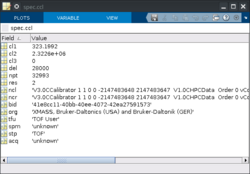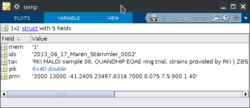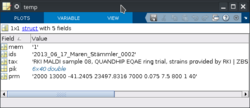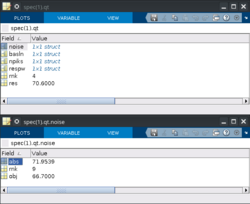Format of Spectral Multifiles: Difference between revisions
No edit summary |
|||
| (16 intermediate revisions by the same user not shown) | |||
| Line 1: | Line 1: | ||
Spectra multifiles combine multiple spectra in one single file. These files are stored in a Matlab™ specific format and contain the spectral, as well as the respective metadata. Spectra multifiles can be loaded in the Matlab environment by entering the following command at the Matlab command prompt: | Spectra multifiles combine multiple spectra in one single file. These files are stored in a Matlab™ specific format and contain the spectral, as well as the respective metadata. Spectra multifiles can be loaded in the Matlab environment by entering the following command at the Matlab command prompt: | ||
>> load('muffname','-mat') | >> load('muffname','-mat'); | ||
where ''muffname'' denotes the name of the spectrum multifile. For example, the command ''load('RKI-ring-trial-spectra.muf','-mat')'' will open the file ''RKI-ring-trial-spectra.muf'', a MALDI-ToF mass spectrum multifile containing 24 individual MALDI- | where ''muffname'' denotes the name of the spectrum multifile. For example, the command ''load('RKI-ring-trial-spectra.muf','-mat')'' will open the file ''RKI-ring-trial-spectra.muf'', a MALDI-ToF mass spectrum multifile containing 24 individual MALDI-ToF mass spectra acquired within the ''so called'' [https://pubmed.ncbi.nlm.nih.gov/26063856/ '''RKI ring trial study''']. The file ''RKI-ring-trial-spectra.muf'' can be downloaded [https://wiki.microbe-ms.com/upload/RKI-ring-trial-spectra.muf: '''here''']. If loading was successful, you will have access to a new Matlab variable ''spec'' (struc array). Details of the structure of ''spec'' are described next.<br> <br> | ||
== Fields of the structure array '''''spec''''' == | == Fields of the structure array - '''''spec''''' == | ||
<br> | <br> | ||
{| class="wikitable" width=1100 | {| class="wikitable" width=1100 | ||
| Line 151: | Line 151: | ||
|- | |- | ||
| lms | | lms | ||
| MALDI- | | MALDI-ToF MS, or LC-MS¹ data? (0: MALDI, 1: LC-MS¹) | ||
| float32 | | float32 | ||
|- | |- | ||
| Line 159: | Line 159: | ||
|- | |- | ||
| ccl | | ccl | ||
| [[#structure array ccl|calibration information]] | | [[#structure array ccl|calibration information]] | ||
| struc array | | struc array | ||
|- | |- | ||
| avr | | avr | ||
| [[#structure array avr|average spectrum]] | | [[#structure array avr|average spectrum]] | ||
| struc array | | struc array | ||
|- | |- | ||
| dbs | | dbs | ||
| [[#structure array dbs|data base spectrum]] | | [[#structure array dbs|data base spectrum]] | ||
| struc array | | struc array | ||
|- | |- | ||
| Line 180: | Line 180: | ||
|} | |} | ||
== | == Peak table format - '''''spec.pik''''' == | ||
<span class="mw-headline" id="peak table format"></span> | <span class="mw-headline" id="peak table format"></span> | ||
| Line 207: | Line 207: | ||
|} | |} | ||
== Calibration | |||
== Calibration information - '''''spec.ccl''''' == | |||
<span class="mw-headline" id="structure array ccl"></span> | <span class="mw-headline" id="structure array ccl"></span> | ||
| Line 279: | Line 280: | ||
|} | |} | ||
== Database | |||
== Database spectra - '''''spec.dbs''''' == | |||
<span class="mw-headline" id="structure array dbs"></span> | <span class="mw-headline" id="structure array dbs"></span> | ||
| Line 294: | Line 296: | ||
| specifies whether the current spectrum is a data base spectrum (1) or not (0) | | specifies whether the current spectrum is a data base spectrum (1) or not (0) | ||
| char array | | char array | ||
| rowspan=" | | rowspan="5" style="background: #ffffff;" valign="top" |[[File:dbs-format-spec-struc.png|250px|thumb|center|Screenshot of structure array ''spec.dbs''. This screenshot shows information like the spectrum id, taxonomic information, peak tables, respective peak detection parameters, etc of mass spectrum #1 [spec(1).dbs(1,1)] that was used with others to obtain a database spectrum]] | ||
|- | |- | ||
| ids | | ids | ||
| id | | id of the individual mass spectrum that contributed to the given database spectrum | ||
| char array | |||
|- | |||
| tax | |||
| contains taxonomical information (i.e. the genus, species, strain information) | |||
| char array | | char array | ||
|- | |- | ||
| pik | | pik | ||
| | | peak table of the given source spectrum | ||
| float32 | | float32 | ||
|- | |- | ||
| prm | | prm | ||
| parameters | | parameters used for peak detection | ||
| char array | | char array | ||
|} | |} | ||
== Average | == Average spectra - '''''spec.avr''''' == | ||
<span class="mw-headline" id="structure array avr"></span> | <span class="mw-headline" id="structure array avr"></span> | ||
| Line 330: | Line 328: | ||
|- | |- | ||
| mem | | mem | ||
| specifies whether the | | specifies whether the contributing spectrum is an average spectrum (1) or not (0) | ||
| char array | | char array | ||
| rowspan=" | | rowspan="6" style="background: #ffffff;" valign="top" |[[File:avr-format-spec-struc.png|250px|thumb|center|Screenshot of structure array ''spec.avr''. This screenshot shows information like the spectrum id, taxonomic information, peak tables, respective peak detection parameters, etc of mass spectrum #1 [spec(1).avr(1,1)] that was used with others to obtain an average spectrum]] | ||
|- | |- | ||
| ids | | ids | ||
| id of the individual mass spectrum | | id of the individual mass spectrum that contributed to the given average spectrum | ||
| char array | |||
|- | |||
| tax | |||
| contains taxonomical information (i.e. the genus, species, strain information) | |||
| char array | | char array | ||
|- | |- | ||
| pik | | pik | ||
| peak table of the source spectrum | | peak table of the given source spectrum | ||
| float32 | | float32 | ||
|- | |- | ||
| | | prm | ||
| | | parameters used for peak detection | ||
| char array | | char array | ||
|} | |} | ||
== Quality | |||
== Quality test results - '''''spec.qt''''' == | |||
<span class="mw-headline" id="structure array qt"></span> | <span class="mw-headline" id="structure array qt"></span> | ||
Latest revision as of 17:01, 11 April 2025
Spectra multifiles combine multiple spectra in one single file. These files are stored in a Matlab™ specific format and contain the spectral, as well as the respective metadata. Spectra multifiles can be loaded in the Matlab environment by entering the following command at the Matlab command prompt:
>> load('muffname','-mat');
where muffname denotes the name of the spectrum multifile. For example, the command load('RKI-ring-trial-spectra.muf','-mat') will open the file RKI-ring-trial-spectra.muf, a MALDI-ToF mass spectrum multifile containing 24 individual MALDI-ToF mass spectra acquired within the so called RKI ring trial study. The file RKI-ring-trial-spectra.muf can be downloaded here. If loading was successful, you will have access to a new Matlab variable spec (struc array). Details of the structure of spec are described next.
Fields of the structure array - spec
| Fields | Description | Data type | |
|---|---|---|---|
| org | original mass spectra [2 x n array], n: number of data points | float32 | 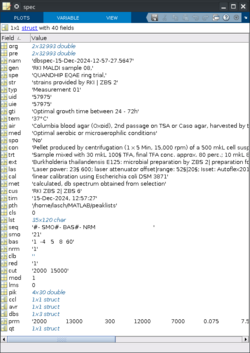 Screenshot showing the content of the structure array spec that is stored in so called spectrum multi files (*.muf). Fields of spec contain spectral data (original, i.e. unmodified, and pre-processed), spectrum metadata as well as peak lists, calibration information, results of quality tests, and information collected during creation of average, or database spectra. In the example of the given screenshot, the content of one database spectrum is depicted. |
| pre | pre-processed spectra [2 x n array], n: number of data points | float32 | |
| nam | spectra id | char array | |
| gen | genus information | char array | |
| spe | species info | char array | |
| str | strain info | char array | |
| typ | type | char array | |
| uid | taxonomy identification number for species as used by the NCBI (see [1]), can be modified | char array | |
| uie | unmodified taxonomy identification number for strains used by the NCBI (see [2]) | char array | |
| gti | cultivation conditions: growth time | char array | |
| tem | cultivation conditions: cultivation temperature | char array | |
| air | cultivation conditions: cultivation under aerobic or anaerobic conditions | char array | |
| med | cultivation conditions: cultivation medium | char array | |
| spo | spore formers (Yes or No) | char array | |
| con | sample concentration | char array | |
| trt | sample treatment | char array | |
| ext | extra information | char array | |
| las | laser parameters (power, spot diameter, frequency, etc.) | char array | |
| cal | calibration info | char array | |
| met | measurement method | char array | |
| cus | customer info | char array | |
| tim | date and time of measurement | char array | |
| pth | path to spectrum | char array | |
| cls | class assignment (valid values are 0,1,2,3 and 4) | float32 | |
| lst | formatted text containing the peak table info | char array | |
| seq | sequence of pre-processing steps | char array | |
| smo | the number of smoothing points (Savitzky-Golay smoothing) | char array | |
| bas | number of intervals used for baseline correction | float32 | |
| nrm | normalization parameter (Yes:1, No:0) | float32 | |
| clb | calibration parameters (not used) | float32 | |
| red | data reduction factor (spectral binning) | char array | |
| cut | cut in the spectral domain, m/z range | char array | |
| tmp | temporary info (not always present) | char array | |
| mod | original data modified by cut spectra or reduce resolution (Yes:1, No:0) | float32 | |
| lms | MALDI-ToF MS, or LC-MS¹ data? (0: MALDI, 1: LC-MS¹) | float32 | |
| pik | peak table, an array of the dimension [4 x npeaks] or [6 x npeaks], where npeaks denotes the number of peaks | float 32 | |
| ccl | calibration information | struc array | |
| avr | average spectrum | struc array | |
| dbs | data base spectrum | struc array | |
| prm | parameters of peak detection | char array | |
| qt | quality test parameter | struc array |
Peak table format - spec.pik
| Fields | Description |
|---|---|
| spec.pik(1,:) |
m/z positions of the peaks in the peak table |
| spec.pik(2,:) |
absolute intensities of these peaks |
| spec.pik(3,:) |
weighting factors (the sum of these factors equals 100) |
| spec.pik(4,:) |
in case of single spectra, i.e. no database or average spectra: baseline-corrected absolute intensities of the peaks, in case of average or database spectra: the relative peak frequency |
| spec.pik(5,:) |
FWHH of the given peak (requires QT) |
| spec.pik(6,:) |
resolving power of the given peak (requires QT) |
Calibration information - spec.ccl
| Fields | Description | Type | |
|---|---|---|---|
| cl1 | calibration constant 1 | float32 | |
| cl2 | calibration constant 2 | float32 | |
| cl3 | calibration constant 3 | float32 | |
| del | delay time [ns] | float32 | |
| npt | number of data points | float32 | |
| res | time resolution [ns] | float32 | |
| ncl | calibration info required to store the spectrum in a Bruker-specific data format | char array | |
| ncr | calibration info required to store the spectrum in a Bruker-specific data format | char array | |
| bid | hardware id of the spectrum ('Bruker ID') | char array | |
| mid | MicrobeMS id of the spectrum | char array | |
| org | manufacturer info | char array | |
| tfu | 'ToF user' | char array | |
| spm | not used | char array | |
| stp | type of measurement (should be 'TOF') | char array | |
| acq | further acquisition info | char array |
Database spectra - spec.dbs
A database spectrum is usually created from many (>3) individual mass spectra. Like in regular experimental spectra, spectral data and metadata of average spectra are stored in specific fields of structure array spec. In database spectra the field spec(i).dbs is used to store relevant data from experimental source spectra from which the given database spectrum has been derived. These fields are left empty in experimental and average spectra. Details of the structure of spec.dbs are given in the table below.
| Fields | Description | Type | |
|---|---|---|---|
| mem | specifies whether the current spectrum is a data base spectrum (1) or not (0) | char array | |
| ids | id of the individual mass spectrum that contributed to the given database spectrum | char array | |
| tax | contains taxonomical information (i.e. the genus, species, strain information) | char array | |
| pik | peak table of the given source spectrum | float32 | |
| prm | parameters used for peak detection | char array |
Average spectra - spec.avr
An average spectrum is usually created from many (>3) individual mass spectra. Like in regular experimental spectra, spectral data and metadata of average spectra are stored in specific fields of structure array spec. In average spectra the field spec(i).avr is used to store relevant data from experimental source spectra from which the given average spectrum has been derived. These fields are empty in experimental and database spectra. Details of the structure of spec.avr are given in the table below.
| Fields | Description | Type | |
|---|---|---|---|
| mem | specifies whether the contributing spectrum is an average spectrum (1) or not (0) | char array | |
| ids | id of the individual mass spectrum that contributed to the given average spectrum | char array | |
| tax | contains taxonomical information (i.e. the genus, species, strain information) | char array | |
| pik | peak table of the given source spectrum | float32 | |
| prm | parameters used for peak detection | char array |
Quality test results - spec.qt
The structure array spec.qt contains the results of a Quality Test. Fields of this structure are empty if no QT has been performed. Details of the structure of spec.qt are given in the table below.
| Fields | Description | Type | |
|---|---|---|---|
| noise | QT data of the noise test, contains fields abs, rnk, and obj | struc array | |
| basln | QT data of the baseline test, contains fields abs, rnk, and obj | struc array | |
| npiks | QT data of the test number of peaks, contains fields abs, rnk, and obj | struc array | |
| respw | QT data of the test resolution power, contains fields abs, rnk, and obj | struc array | |
| rnk | overall rank that the given spectrum has achieved in a QT with a number of other spectra | float32 | |
| res | overall quality test score | float32 |
